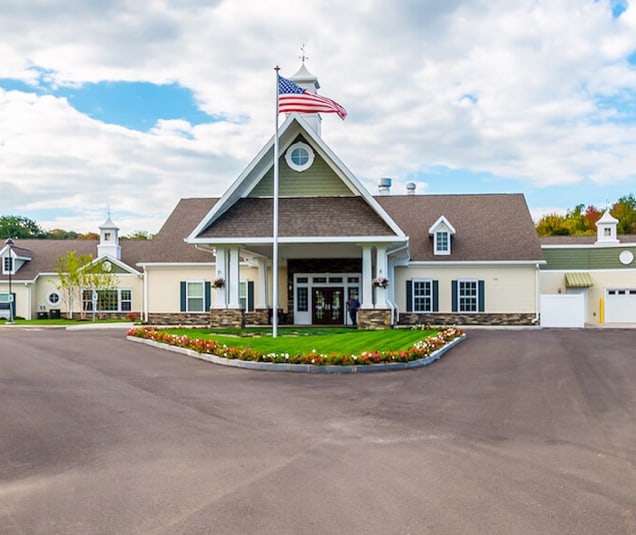When a loved one is diagnosed with dementia or memory impairment, families often face uncertainty and concern. Traditional living environments may no longer provide the personalized support, safety features, and therapeutic engagement needed to provide a high quality of life.
Memory care is a specialized form of senior living that can make a transformative difference.
By offering tailored environments, trained staff, cognitive programming, and compassionate care, memory care communities help seniors live with dignity, purpose, and comfort—even as the disease progresses.
What Is Memory Care?
Memory care is a distinct type of senior support focused on individuals with Alzheimer’s disease, dementia, or conditions that cause progressive cognitive decline, like Parkinson’s disease.
These communities provide secure settings, cognitive-focused programs, and specially trained staff to help residents feel safe, engaged, and understood.
Personalized routines and a calm environment help reduce confusion, promoting comfort, dignity, and meaningful daily experiences.
Creating a Safe & Supporting Environment
Specialized memory care residences are purpose-built to reduce confusion and increase safety:
- Controlled access & clear walking paths help prevent wandering & enable safe, independent movement
- Simple floor plans help reduce stress & confusion, encouraging independence & autonomy
- Sensitive design features—like contrasting floor colors & visual cues—help residents navigate spaces more easily
- Soft lighting, soothing décor, & calming sensory areas help minimize agitation & promote calm
These thoughtful modifications reduce anxiety, promote resilience, and create a true “home” environment.
Reducing Risks of Falls & Accidents
Falls are the leading cause of fatal and non-fatal injuries among older adults. Memory care communities go beyond regular living settings by integrating safety controls:
- Supportive railings & clear pathways significantly help prevent falls, slips, & wandering risks
- Staff are trained to supervise discreetly—especially during bathing, toileting, & mobility transfers
- Emergency response systems are monitored 24/7, allowing staff to provide rapid assistance
With these measures in place, residents enjoy more freedom, and families gain peace of mind.
How Personalized Care & Qualified Staff Support Helps
Memory care programs train staff in techniques specific to dementia care:
- Understanding triggers
- Recognizing & addressing environmental factors that may provoke confusion
- Validation therapy
- Accepting residents’ perceived reality to support emotional connection
- Behavioral support
- Redirecting & de-escalating anxiety, agitation, or confusion
Their specialized training means daily interactions are supportive and emotionally empowering.
Customized Care Plans
Rather than a one-size-fits-all approach, memory care uses personalized care plans:
- Individualized routines incorporate sleep patterns, preferences, & past interests
- Balanced nutrition & hydration plans reduce health risks & support cognitive function
- Frequent assessments to help staff adjust support as residents’ needs evolve
Tailored care helps residents stay calm, oriented, and engaged.
Therapeutic Programs that Support Cognition
Memory care communities offer a range of thoughtfully designed programs:
- Life story & reminiscence sessions celebrate personal history & family connections
- Music therapy & rhythm activities tap into procedural memory & joyful expression
- Puzzles, word games, & brain exercises offer mental stimulation at varying difficulty levels
These activities ease memory decline while supporting dignity and self‑esteem.
Movement Adapted to Needs
When cognitive changes create barriers to physical activity, memory care supports movement with:
- Gentle group exercises like tai chi or chair yoga to improve mobility & mood
- Walking programs to promote Vitamin D, circulation, & physical engagement
- Sensory movement rooms offer soft music, gentle lighting, & textures for stimulation
Thoughtful exercise supports both body and mind in a balanced and adaptive way.
Emotional Support & Social Connection
Isolation can worsen dementia symptoms. Memory care focuses on daily social routines:
- Breakfast & dinner together encourage conversation & belonging
- Small group activities like painting, gardening, & crafts foster confidence & camaraderie
- Community celebrations & cultural events maintain routine & structure
Consistent social interaction can significantly help reduce isolation, increase serotonin levels, and calm tension.
Comforting Family Involvement
Memory care communities keep families connected through:
- Regular check-ins & family conferences to update care plans
- Reminiscence activities that share stories & videos
- Therapeutic visits, like art or music workshops, that include loved ones
Families feel supported, involved, and informed on their loved one’s journey.
Supporting Health Through Specialized Services
Communities design memory care to adapt to residents’ evolving physical needs.
Medication & Clinical Oversight
- Accurate medication administration to reduce dosing errors
- Monitoring for side effects of dementia medications or chronic illness treatments
- Care coordination connecting families with doctors and therapists as needed
A clinical focus supports both mental and physical health.
Nutritional & Mealtime Engagement
Many people with memory loss struggle with eating and hydration:
- Prompted, assisted mealtimes encourage intake while maintaining independence
- Adaptive dinnerware, like no-spill cups & shaped utensils, promotes dignity
- Nutrient-dense menus reduce deficiencies & support cognitive function
Mealtime becomes a nurturing, enjoyable communal routine.

Enhancing Quality of Life Through Purposeful Activities
Memory care is more than meeting daily needs. It’s a lifestyle built around enriching the lives of individual residents.
Encouraging Meaningful Engagement
Residents thrive when they feel useful and purposeful. Memory care includes:
- Sensory gardens & horticultural therapy to connect with nature
- Song, dance, & poetry events to encourage self-expression
- Lounges for reading, reminiscing, or quiet social time
These practices help preserve meaning and reinforce self-worth for a person living with dementia.
Flexible Routines for Comfort
The hallmark of specialized memory care is consistency:
- Structured, familiar daily routines reduce stress & promote predictability
- Adjustable staffing levels throughout the day provide attention during high-need periods
- On-site amenity access, like spas, cafes, & outdoor spaces, supports daily variability
Residents gain the freedom to live well within a secure and comforting environment.
Benefits for Families & Caregivers
Memory care supports families through:
- Regular care conferences to update & plan progression
- Community support groups that connect families facing similar challenges
- Access to education & resources like disease-specific workshops & family counseling
Families feel informed, listened to, and empowered in a supportive network.
Reducing Stress & Guilt
Caring for a loved one with dementia leaves many families feeling exhausted and overwhelmed. Specialized memory care provides:
- Relief from 24/7 responsibility, reducing caregiver burnout
- Reassurance knowing they’re cared for by qualified professionals
- Respite opportunities for family self-care & emotional recovery
Families spend more quality time—not just caretaking time.
A Compassionate Choice for Your Loved Ones
When memory challenges surface, it can be hard to watch a loved one grow more dependent. But choosing specialized memory care isn’t about loss—it’s about providing a secure, enriching environment where life continues to matter.
Through clinical care, structured engagement, emotional connection, and secure surroundings, memory care communities offer a path to dignity, fulfillment, and well-being—even in the face of dementia.
At Peregrine Senior Living at Onondaga Hill, we are committed to providing memory care that supports every dimension of the person—cognitive, emotional, spiritual, social, and physical.
Our dedicated staff, enriched programming, and carefully designed environment enable individuals with dementia to continue to experience life with purpose, connection, and respect.
Schedule a visit today to explore how our specialized memory care can benefit your loved one.












No more posts